
Content
The Road to Recovery
| The Road to Recovery by Burson-Marsteller | ||
| CEOs Carry Twice the Burden of Reputation Recovery CEO Apologies Are the First Step In Reputation Recovery According to a Burson-Marsteller CEO Reputation Study The burden of responsibility for restoring a company’s damaged reputation rests squarely on CEO shoulders, according to global communications consultancy Burson-Marsteller’s recent CEO reputation study. When top executives were asked who was responsible for repairing company reputation, executives attributed 68 percent of the responsibility to the CEO and 32 percent to the board of directors. The study was conducted in August 2004 by WirthlinWorldwide among Fortune 1000 executives. “Because CEOs are so strongly linked to corporate reputations, business influencers expect CEOs to take full responsibility for restoring reputation when tarnished,” remarked Patrick Ford, chair of Burson-Marsteller’s Corporate/Financial Practice. “Despite greater board oversight today, CEOs are still held more accountable.” The survey also asked top executives which strategies are most effective in the reputation recovery process. An apology from the CEO is considered the first step to recovery. “A CEO apology shows that the company is sincere and takes responsibility,” says Dr. Leslie Gaines-Ross, Burson-Marsteller’s chief knowledge & research officer and reputation expert. “Apologies build trust among internal and external stakeholders, demonstrate a company’s willingness to communicate honestly and openly, and acknowledge that a problem exists. CEOs must initiate the first step in the turnaround.” Following are additional findings on reputation recovery: | ||
| Although restoring a company’s reputation is a monumental task, it is not impossible. In Burson-Marsteller’s research, 90 percent of executives believe that a company can restore the luster to a tarnished reputation (vs. 97 percent in 2003).On average, recovery takes four years (4.01 vs. 3.81 in 2003). Executives now recognize that reputation recovery takes slightly longer than they thought one year ago.Despite ongoing headlines about corporate malfeasance, crises do fade with time. Executives believe that it takes nearly three years (2.65 years) for a crisis to fade in most stakeholders’ minds.Corporate crises are part of most top executives’ business experience. The majority of executives (67 percent) report having worked for a company or organization that has undergone a crisis that has appeared in the media. |
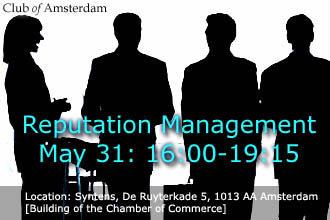
Club of Amsterdam blog
 | Club of Amsterdam blog October 26: Synthesis of elBulli cuisine October 14: The new Corinthians: How the Web is socialising journalism September 20: A Future Love Story |
News about the future of Reputation Management

The Tangible Intangible
Reputation may only exist in the mind of the beholder but it is very clear that its central importance is understood.
Financial analysts, a group who have in the past been accused of having a rather mono-dimensional view of those whom they watch, have a very clear view. Across every region and industry sector there is overwhelming support for the statement that “a company that fails to look after the reputation aspects of performance will ultimately suffer financially too”.
Acceptance of this central truth is particularly marked in Continental Europe, North America and the UK where 61%, 57% and 54% “agree a lot” with the contention. Whilst the precise numbers may vary as to strength of support there are very few dissenters, in fact only between 10% (North America) and 6% (Asia Pacific and Continental Europe) disagree.

Ethics Hotline
Questionable or unethical behavior is anything that runs ontradictory to Fleishman-Hillard’s core values or is a potential violation of the law or our operating policies. Reported incidents are taken very seriously:
– Callers’ identities are protected. Callers remain anonymous unless they choose otherwise. If callers decide to disclose themselves, their identities are held in confidence to the extent practical or lawful.
– Incidents are reported to senior management. Every call results in a notification to Chairman and CEO John Graham, Chief Talent Officer Agnes Gioconda, and the appropriate regional president.
– We will investigate. Each report is fully pursued as soon as possible using the information provided. The firm takes swift action to address any shortcomings that are identified.
News about the Future

Energy-saving sensors
Researchers have developed a new technique for powering nanometer-scale devices without the need for bulky energy sources such as batteries.By converting mechanical energy from body movement, muscle stretching or water flow into electricity, these “nanogenerators” could make possible a new class of self-powered implantable medical devices, sensors and portable electronics.“There is a lot of mechanical energy available in our environment,” said Zhong Lin Wang, a Regents Professor in the School of Materials Science and Engineering at the Georgia Institute of Technology. “Our nanogenerators can convert this mechanical energy to electrical energy. This could potentially open up a lot of possibilities for the future of nanotechnology.”

Radio-controlled fishing boat: Kamome
Radio-controlled fishing boat cruising to a target point to release a fishline. This boat installed with a fish detector and a water temperature sensor detects under-water conditions and better fishing points. Besides, GPS installed on the boat can automatic drive to the designated point.
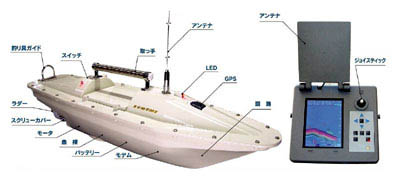
Next Event: Wednesday, May 31, 16:30-19:15
the future of Reputation Management
When: Wednesday, May 31, 2006, 16:00-19:15
Where: Syntens, De Ruyterkade 5, 1013 AA Amsterdam [Building of the Chamber of Commerce]

Mirko Creyghton, Market Leader, Burson-Marsteller Netherlands
Is reputation manageable?

Ingo Heijnen, Group Manager, Hill and Knowlton
Reputation management is not the communicator’s toy

Lucas Michels, Director, Fleishman-Hillard Amsterdam
Reputation management, is it effective?

Bram Alkema
Business Developer, FISQ, Media Monks
Summit for the Future blog
 | Summit for the Future blog http://summitforthefuture.blogspot.com July 13: Summary of the Summit for the Future 2006 May 22: Dispatches from the Frontier |
Recommended Book
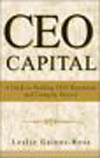
CEO Capital: A Guide to Building CEO Reputation and Company Success
by Leslie Gaines-Ross
The reputations of CEOs and the companies they lead are deeply and inextricably linked. The manner in which the media, investors, analysts, employees, and even the general public perceive a chief executive has tremendous influence over the company’s prosperity, standing, and destiny.
In CEO Capital, Dr. Gaines-Ross describes in practical terms the strategies to follow–and the obstacles to avoid–so that CEOs can enhance the reputation of their company during the five stages of their tenure.CEO Capital is the only book that provides these guidelines and isolates best practices for CEOs as they navigate their way through their first 100 days to their last 100 hours.About the author: Dr. Leslie Gaines-Ross is chief knowledge and research officer at Burson-Marsteller, a leading global communications consultancy with more than 1,600 employees worldwide. Previously, she served as Fortune’s communications and marketing director.
Announcement
iKarma is an online reputation management system designed for business and professionals. The English language version is currently available at www.iKarma.com and translation in to other languages is currently underway. iKarma is actively seeking partners interested in helping with our plans for international expansion.
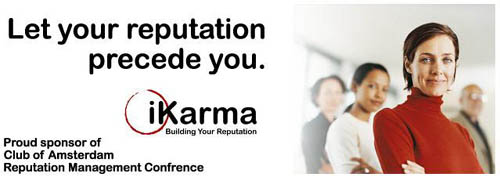
Europe in 2020.
| Europe in 2020. Towards a new golden century, a silver century, and back to the middle ages by Marcel Bullinga, Futurecheck |
| – So, what is life like in 2020? What inventions will be the telephone, TV & car of 2020? – Here is how Europe can prepare for the future – With multiple chances for business & government innovation Dear Mr. Friedman, Rifkin and Florida, Yes indeed, you are right. The world is getting flatter and we need technology, creativity and talented people to survive. We have to deal with wealth worldwide, not poverty anymore. Europe possesses a very strong and very positive legacy. It can and will survive 2020, but it is necessity, not choice, that will drive us. We lose low and high end jobs, disappearing into the technology and into other countries. We lose our educational strength. Europe is too rich and too lazy. Europe needs a dream, a focus. Please permit me — an independent European futurist, a native of the old continent, and proud of it — to outline European survival in 2020. So, what’s life like in 2020? |
We will witness an acceleration in change and an overall sense of insecurity. Due to globalisation, 2020 is flat, with less trade, knowledge and entry barriers. 2020 is filled with nomadic people in a constant flow of short and semi-permanent stays all over the world, creating a constant brain and workplace circulation. Due to digitalization, 2020 is virtual with intelligent houses, cars and streets. Basically, it is one giant video camera. We will gain and lose privacy. 2020 is transparent and, as a result, hyper competitive. Every one knows your achievements and your failures, and only highest quality will survive. Government and law enforcement will turn digital and invisible: less bureaucratic, more powerful. In this world it is difficult to lie or to hide. The mix of bits, atoms and genes will cause a production and services revolution, such as: printing products at a distance; personal selfservice dashboards for customers & citizens; and low cost, high quality virtual mobility tools. These inventions will have the same effect around 2020 as telephone, TV, and automobile had in the 20th century…
All of this may lead us into a new Golden Century — which we will need to tackle the enormous energy and congestion problems of 2020. In some ways, 2020 resembles the Middle Ages. Back then the city provided safety, stimulated trade, and made children grow up very fast. The world will be crowded with old people with a lesser drive for innovation. It will make traditional social security unaffordable, but it will also create a wealthy grey market: Silver Century.
2020 is about customer power, self control and self service. It is about personalized services around global commodity products, about making technology invisible. It is about simplicity of choice, about identity and lifestyle — the only real cliff hangers in the fast world of 2020. Such a world needs flat & flexible organisations, and creative people with a drive for success.
The trend of globalisation, no matter how powerful it is, can be reversed. The following emerging counter trends might do the job. Unmanageable congestion problems. Global energy wars. A failure to stop low talent immigrants, thus creating major safety and social security problems. A failure to attract top talent immigrants, thus creating a fallback in research and innovation.
Any European dream worth the name must recognize these trends and counter trends and must have answers to them. What we need the most, is energy, passion and enthusiasm. The energy derived from a shared goal, a goal that every normal citizen understands and embraces. We need the European equivalent of a moon landing. In fact, we need multiple moon landings in 2020. Here they are. We need to be energy independent and self sufficient. We need global, individual portability of pensions, education possibilities and health care. We need to implement smart law enforcement. We need to develop low cost high quality virtual mobility tools. We need to take advantage of the Silver Century. We need to lead the production and services revolution. To maintain our wealth, we need to make our organisation flexible & creative. To maintain our civilization, we need a straight back and a secular society.
A dream is not about dreaming. It is about taking action! If in the next 15 years we land on all these moons, we will survive. So, let’s start innovating now!
As an independent European futurist and regular public speaker, I have the privilege of presenting the future and sharing my ideas with many different audiences. Four of these audiences, at the end of 2005 and the beginning of 2006, made me think about Europe’s future, and write this article.
For Philips Research and a Technical University in Holland, I presented the future of nanotechnology. It was a distinguished audience of wise professors, whom I seated in the left corner, and ambitious young students, whom I seated in the right corner. Place of action: Eindhoven, The Netherlands. I showed images of technology and even more images of creativity and communication, images of people. There in Eindhoven I witnessed a flow of energy, of pioneering spirit, but afterwards, I became worried. If I were asked to repeat this presentation in 2020, would the right corner still be filled with youngsters? Qualified youngsters? Or would it be empty, meaning I would have to hold my presentation in Bangalore, India?
Then I helped the united top of Dutch civil servants to think about government in 2015. Most people in the audience were convinced of their ability to cope with 2015, whatever the situation might be. That may well be the case for each one of them individually — all smart people in fortunate situations — but I left puzzled with the question: will “the” government be able to cope with 2015? Will government be able to reduce governmental chaos, implement truly digital government services and taxes, keep society secular, and ready for the rat race for global talent as well? The question remained unanswered, and that was my second worry.
Then I addressed the Dutch Top 100 of police chiefs, and a bunch of mayors and public prosecutors. Interactively, we shared ideas about the future of safety. What safety scenario’s are most likely in 2020? Again, I shared images of technology, but above all images of renewed authority. Decent citizens have so much to gain from embedding hi-tech into the safety business process, and these police chiefs were absolutely willing to do so. The police winners of 2020 will be the upcoming creative leaders that are capable of combining all of these challenges. I remember vividly one critical remark. A police chief told me his concern. That technology might well boost crime solving rates but it would destroy civil rights at the same time. I am convinced this is not true. Using a proper mix, crime solving can rise to a stunning 50% with no loss of civil rights whatsoever. Due to the essential characteristic of smart law enforcement: only the criminals, not decent citizens, are confronted, bothered and checked in a smart world. My main worry: will police officers have enough backbone to regain the authority in the street they lost in the 20th century?
Last but not least, I dwelled in the beautiful, ancient city of Rome. There I had a Question and Answer session with the top 50 managers of a multinational company. We talked about the probable and their desirable future. We brainstormed about the smart deployment of technology based on the user point of view. We talked about making technology invisible. We talked about identity and lifestyle, about simplicity of choice, the only real cliff hangers in the virtual and fast world of 2020. We talked about technology making illnesses disappear, therefore eliminating the need for certain medical devices and functions. We talked about marketing solutions and nearness instead of products. Basically, without saying so, we talked about turning threats into chances. I had no worries after this inspiring meeting!
Europe has serious problems. Hell no, let me rephrase that: Europe faces interesting challenges. Stay positive! The old European economies go down on several international listings. Europe is too rich, too lazy and lacks a dream, a focus. And I am not quite sure if Europe values its liberties and its civilisation enough to fight for it, now that it is being challenged. Europe needs a wake up call.
Thousand experts on five continents told the CIA that the keyword for 2020 is insecurity. Old economic roles have changed, old habits have died, old certainties have disappeared. It is necessity, not choice, that will drive us. We have not seen anything yet, because change itself will be accelerating. We might well return to the Middle Ages. Back then, the city provided safety, stimulated trade, and made children grow up very fast. It was also the age of cruelty and intolerance. With the keyword being “insecure”, our response keywords must be: “flexible” & “creative” to maintain our wealth, and “straight back” & “indifference” to maintain our civilization.
But hey, let’s count our blessings as well! Europe has a very powerful, very positive legacy of civilization to be proud of. Equal rights for women and gays, 50 years of peace, a secular society with a strict separation of religion and government, freedom of press, a powerful knowledge base, low on corruption, high on culture & wealth, still going strong on patents and nanopatents. European citizens are all millionaires compared to the poor people who lived in the Middle Ages. And maybe Europe’s biggest achievement nowadays is our humour and self ridicule. I am proud of these assets, and they are going to help us tackle the challenges. Every problem described here is a chance for innovation and spiritual growth.
Are you fit to tackle 2020?
Do you think you are fit to tackle the challenges? Fit for survival in 2020? Suppose it is January 1st 2020. You’ve got mail! (or something alike). It says you are fired, together with all other European employees. Freelance work and entrepreneurship is the rule, steady employment the exception. Furthermore, the mail says government budget is cut by half. A flat tax is introduced. Half of it is going to be spent on tools for entrepreneurs to create wealth, like education, research and innovation. The other half is going to be spent on basics like health care and safety. Social security has disappeared. Government is no longer redistributing wealth, only stimulating the creation of wealth.
So, ask yourself. Would your skills be enough to compete in a knowledge economy where maybe all jobs need higher education? Where much work will be footloose? In 2020, all jobs and all organisations will be decomposed and split into various virtual and physical parts. Maybe your entire profession will be obsolete. So the question is, will you be re-hired? Or will you yourself do the hiring?
(Maybe I should not be asking you. Maybe your children should read this piece and answer these questions, because they will be the future and experience it as self evident and natural.)
The answer, of course, depends on the eventual situation in 2020. So, what is life like in Europe in 2020? The following trends will reshape Europe in 2020. Thanks to globalisation, 2020 will be flat, with less trade barriers, country barriers and knowledge barriers, but more identity barriers. Thanks to demographics and immigration, it will be crowded with culturally mixed people who have much less in common than now and who are generally rather old, with a lesser drive for innovation. Thanks to technology (the mix of nano, digital and bio), 2020 will be virtual or smart. An all-video, all-virtual world in which everybody and everything is online without even realizing it, filled with intelligent machines, buildings and cars. Intelligent machines will be lighter, smaller and will use less energy in a more efficient way. They will sense their environment, sense themselves, able to make decisions and to be repaired at a distance. In fact, every machine will be a mobile phone, talking to their owner but mainly to other machines. Our cars will be connected to other cars and drive themselves, aware of the road and your destination, thereby reducing congestion. It will increase overall security. Uninsured driving? Driving in a stolen car? Exceeding the current speed limit? Impossible.
The combined effects of the virtual and the flat world will change the very nature of every business model, every production process, every service. It will lead to a transparent, hyper competitive world and an invisible, less bureaucratic and yet more powerful government.
You ask me if it will be a happy world? Well, that depends on you. On what we do and don’t. These trends pose both the problem and the solution. They contain tremendous opportunities for realizing the very concrete dream of a creative, secular and wealthy Europe in 2020. They may lead us to excellence, but missing out on them may well bring us down. Cope or perish! This story is not a story of ideology; it is a story of necessity. There is enough room for growth for all continents and for cooperation between them. A dream is only worth dreaming if you have a path and a toolbox and a plan of action. Here is how to seize the opportunities.
So, what’s life in 2020? One big video camera, adult children, your home and the street as living creatures
In 2020, we will always be online without realizing it. And not only we will always be online — so will our machines, cars and homes. Your coffee machine and the walls in your home will talk to you, and most of the time those machines will talk to each other. We will even have self-cleaning and self-repairing bridges, cars, tables, homes, walls and windows. Our surroundings, our homes, our streets will be like living creatures, sensitive to us and even responding to our behaviour. You will not be able to tell the difference between the virtual and the physical world anymore. Physical will be virtual and virtual will be physical. The internet grid will merge into the power grid, the transport grid, the grid of shareable machines, the grid of rules, the grid of taxes, the semantic grid.
When you think 2020, think video. Video-dating, video-chatting, video-making-your-homework, video-working-together, in short, video-life. You will be watching movies, chatting and phoning with other people all over the world on the walls of your house. You will work together virtually, you will enjoy sports together virtually, you will date virtually. You can keep in touch with your (grand)parents by taking them into your house virtually. Daily eye to eye contact combined with automated medical checks, using the giant video walls. Like in the Middle Ages, but without the lack of privacy that was so common in those days. Life will be very intense with lots of partly pleasurable and partly unavoidable sensory and information stimulations. The silent printed images that surround us now, will come to noisy life in 2020. In the streets we will be overflowed with personalized video walls. It will not be possible to escape the huge and noisy video advertisements. Two possible scenario’s: either we get used to it, or it leads to government regulation.
In 2020 the world is one big video screen, one big video camera, one big mobile phone. In this transparent world, it is difficult to hide. The mobile will be the most important lifestyle instrument and small camera’s will be all over the place. We will be filmed while drinking, walking down the street, having sex, fighting, doing our jobs, without prior notice or permission. We will lose our geographical privacy since our GPS-location is always available. We will have the (non)privacy of the celebrities of today. VIP-spotting will turn into neighbour-spotting. Private communication can and will turn up on internet for public display without the user’s permission, and it will undermine public trust. These new facts of life may well lead to an increasingly exhibitionist culture in which porn images are street images, in which sex is not private but (semi) public, fun to share or to watch. Even at present, teen boys and girls use video chat sites to masturbate life, anonymous or even face visible, for any virtual visitor passing by. Fun! Share! This situation is, literally, unique in the history of mankind. What will it do to us? I don’t know…
Due to the incredible amount of easy means of communication, children will be exposed to adult content in all thinkable ways at a very early age. They will get used to kicks, they will need more kicks and even more extreme kicks. Just staring out of the car on the way to the holiday destination, or feeling bored, like children in the old fashioned days did, without a screen providing distraction and entertainment, will be unthinkable. Thrill Fun Chill! The ever present mobile phone will give children not only more personal entertainment, but also more personal privacy and personal reachability then they ever had in history (or wanted to have). This will make parent’s at-home supervision obsolete. It will pose the biggest threat and the biggest challenge to modern upbringing.
In this fast video world, in this zap & cut & paste culture, children will be adult very early. Adults in a speedy nano-second video culture of psychological multi tasking. They will grow up earlier than ever before. A bit like the early maturing in the Middle Ages. Puberty will be shorter than now and start earlier. Children will be street wise, drink alcohol and have sex at a much earlier age than now. It will be quite normal for youngsters to work and travel all around the world — if not physically, then at least virtually. They will be extremely critical consumers, which will force businesses and governments to stick to ultimate high quality standards. Their horizon will be broader. It will make our children more socially adaptable and cause concentration problems at the same time. They will probably not be able to tell the difference between private and public anymore, between school yard and pub. Virtually, it’s all the same!
In 2020, it will be easy to get to know new people worldwide and to innovate worldwide and it will be easy to spread hate worldwide. Back in 1994, I was one of the first Dutch Internet pioneers with his own website. My first two thoughts back then: Wow, this means freedom!; and Wow, everything will be Web! Theoretically, I knew the Web would ease the spread of both compassion and hate, but I never imagined religious hate and intolerance would mount so easily to such furious heights. Even in our daily life, we tend to be more brutal, more demanding, less polite, less polite. It will probably be more and more difficult to find government leaders willing to take the heat from citizens acting like mad, brutal dogs. We may see global multimedia multinationals with no morals whatsoever, providing depravated bread & games, like in the ancient Roman Empire, but now for a global audience and with a global moral impact.
All in all, 2020 is the living “experience economy”. With less physical and more virtual shops. Consuming will be theater, and theater will be consumed day and night. This fast world with fast emotions and fast hypes and extreme kicks and too many choices will drive us mad and will create a powerful need for counter trends like silence, quietness and slowness, and businesses that organise warmth, simplicity & choices. Two scenario’s are possible here. 1, Our notion of embarrassment itself will change, our notion of what is private and what is public. Or 2, We will turn to government and technology for protection against these grave privacy intrusions. We will badly need technology tools to give us back control over our pictures, our documents and our life. We will want technology to enable “personal selfservice dashboards” and “permission instruments”, like pictures and camera’s and screens that only display if we give permission.
Personal Dashboard 2020. Please give us back control over our life
In 2020, there will be so many companies and governments wanting to communicate with us, that it is impossible to keep overview. There will be so many criminals spamming us, trying to steal our identity and invading our video and locational privacy, that we will feel like loosing the battle. In 2020, more than ever before in history, we need control. Control over our personal data, our subscriptions, our financial transactions, our privacy. Control over our communications with the rest of the world. We need a tool to manage all our transactions and personal files and to protect us against identity theft and spam at the same time. A tool that integrates all information, flowing into and out of our mobile phone, our laptop, our home, and gives us the power of selective availability and selective communication. This tool will help us to make choices and create simplicity. We need this virtual driver seat because it is an essential tool for survival in a virtual and transparent future. And we must be in the driver’s seat. Not the government. Not the bank. Not a global company. But we. We will be in charge and we can be in charge, for the first time in history.
Call this tool Personal Dashboard, a self-service Information Communication and Privacy Control Centre. The next big thing after the website, and a likely bestseller to 8 billion citizens worldwide. Consider it to be your personal manager. With a few clicks, you subscribe and unsubscribe to the newspaper, you order your passport and a pizza, you obtain a residence permit, pay the rent. You allow or block ads. You allow companies and governments and friends to get access to you and to deal with you — or not. You grant permission to companies and governments to use your personal data — or not. In this Personal Dashboard, you will have a current account with your government. Government will act truly as one government, not as many. The motto is: 1 government, 1 face, 1 interface, 1 citizen card — and your unique dashboard is that interface.
The problem is, no one is building Dashboard yet. Sure, there are some attempts, but they are weak. I urge everyone who cares about customer control, to build Dashboard. 8 billion people will buy Dashboard, and Dashboard Company will be the new Google and the new Microsoft of 2020. Stop thinking paper. Stop thinking websites. Start thinking customer power. Start creating Dashboard. Interested in more detail? Read Personal Dashboard 2020. Please give us back control over our life. Open Letter to Bill Gates and Larry Page
The mix of bits, atoms and genes. A new Golden Century in 2020
Three major technologies will shape this smart, virtual world. By 2020 …..
You can read the full article here
Agenda
June 28

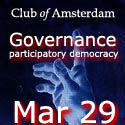
Club of Amsterdam Open Business Club
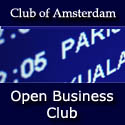
Leave a Reply
Comment
Club of Amsterdam Open Business Club
 | Club of Amsterdam Open Business Club Are you interested in networking, sharing visions, ideas about your future, the future of your industry, society, discussing issues, which are relevant for yourself as well as for the ‘global’ community? The future starts now – join our online platform … |

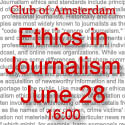
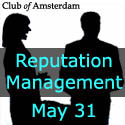



Customer Reviews
Thanks for submitting your comment!